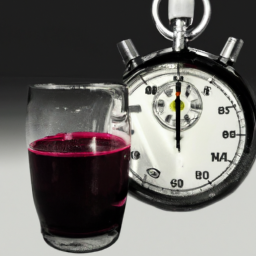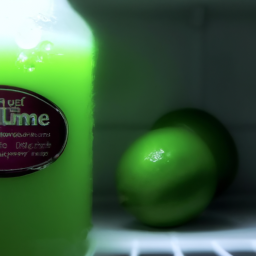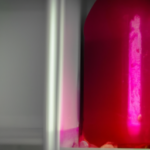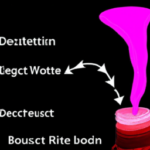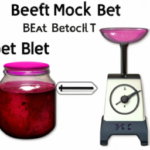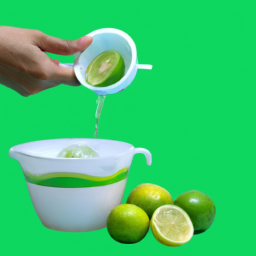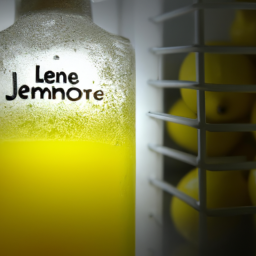As someone who prioritizes using natural ingredients in my diet, I have become fascinated by the various benefits of beet juice. This healthy beverage offers a delicious natural taste and is full of essential vitamins, antioxidants, and minerals that promote general health and well-being.
However, one question that often comes up when discussing beet juice is how long it stays in your system and how it affects urine color and odor.
To answer these questions, its important to understand the factors that can impact how long beet juice stays in your system, as well as the potential side effects and benefits of incorporating this juice into your diet.
In this article, I will explore the science behind beet juice and its effects on urine, as well as provide some tips for enjoying this nutritious drink and incorporating beets into your diet in other ways.
By the end of this article, you should have a better understanding of how beet juice can impact your body and how to make the most of this powerful ingredient.
Key Takeaways
- The length of time beet juice stays in urine can vary depending on individual differences in metabolism and urinary system function.
- Factors affecting beet juice absorption include metabolism, hydration levels, and diet. High-fat meals can slow down absorption while fiber-rich foods can enhance absorption. Drinking plenty of water can help flush out beet juice and waste products.
- Beet juice can cause a potentially alarming change in urine color, but staying well hydrated can help avoid this. Urinary odor intensity can vary depending on personal metabolism, hydration levels, and time elapsed since consumption.
- Beet juice may interact with certain medications and health conditions, so consulting a healthcare professional before incorporating it into the diet is advisable. Digestive issues and changes in stool color may occur with large amounts of consumption, and interference with medications for high blood pressure or erectile dysfunction is possible.
Understanding the Benefits of Beet Juice
You’ll be amazed by how beneficial beet juice can be for your health! Not only is it a great source of vitamins and minerals, but it’s also packed with antioxidants that can help protect your body against disease.
Drinking beet juice has been linked to a wide range of health benefits, including improved heart health, better digestion, and even increased athletic performance. There are also many delicious beet juice recipes out there that can help you incorporate this powerful superfood into your diet.
One of the main health benefits of beet juice is its ability to improve cardiovascular health. Studies have shown that drinking beet juice can help to lower blood pressure, reduce inflammation, and improve circulation.
Beet juice is also rich in nitrates, which can help to improve athletic performance by increasing blood flow and oxygen delivery to the muscles. With so many health benefits, it’s easy to see why more and more people are turning to beet juice as a way to improve their overall health and well-being.
Now let’s explore the factors that can affect how long beet juice stays in your system.
Factors Affecting How Long Beet Juice Stays in Your System
If you’re a regular beet juice drinker, factors like your metabolism, hydration levels, and diet will impact how quickly it leaves your system. The absorption and metabolism of beet juice can be affected by the presence of other foods and drinks in your digestive system. For example, high-fat meals can slow down the absorption of beet juice, while fiber-rich foods can enhance its absorption. Additionally, individual differences in metabolism can impact how fast your body processes beet juice. Some people may eliminate it from their system within a few hours, while others may take longer.
Another key factor that affects how long beet juice stays in your system is hydration. When you’re dehydrated, your body holds onto fluids, which can slow down the elimination of beet juice from your system. Conversely, when you’re well hydrated, your body is better able to flush out beet juice and other waste products. This is why it’s important to drink plenty of water when consuming beet juice, especially if you’re looking to eliminate it from your system quickly. With that said, let’s now explore how beet juice affects urine color.
How Beet Juice Affects Urine Color
Hydration levels and metabolism play a crucial role in the color of urine after consuming beetroot. Drinking beet juice can significantly increase the amount of nitrates in the body, leading to the production of nitric oxide. Nitric oxide is known to improve athletic performance by increasing blood flow and oxygen delivery to muscles. However, it can also cause the urine to turn a reddish or pinkish color.
To avoid a potentially alarming change in urine color, it’s important to stay well hydrated when consuming beet juice. This helps to dilute the nitrates in the body, reducing the concentration of nitric oxide and minimizing the discoloration of urine.
Additionally, athletes should be aware of the timing of their beet juice consumption, as the effects on urine color can be more pronounced during and immediately after exercise.
Moving forward to the subsequent section about how beet juice affects urine odor, it’s important to note that not only can beet juice affect urine color, but it can also affect urine odor. Understanding these effects can help individuals make informed decisions about their diet and hydration levels.
How Beet Juice Affects Urine Odor
Interestingly, research has shown that the odor of urine can be affected by the consumption of certain foods and beverages, including beet juice. When beet juice is consumed, it is metabolized in the body and excreted through the urine. This can result in an increase in urinary odor intensity, which may last for several hours after beet juice consumption.
To understand how beet juice consumption affects urinary odor intensity, here are four key factors to consider:
- The amount of beet juice consumed – the more beet juice consumed, the stronger the odor may be.
- Personal metabolism – some individuals may metabolize beet juice differently, resulting in varying levels of urinary odor intensity.
- Hydration levels – drinking plenty of water can help dilute the beet juice in the body and lessen the intensity of urinary odor.
- Time elapsed since consumption – as time passes, the intensity of urinary odor will likely decrease.
As for how long beet juice may stay in your urine, this can vary depending on the individual and the amount consumed. Let’s explore this further in the next section.
How Long Beet Juice May Stay in Your Urine
I’ve been interested in the effects of beet juice on urine odor for some time now. I wanted to learn more about how long beet juice may stay in your urine. Studies have shown that the length of time beet juice stays in your urine can vary depending on individual differences in metabolism and urinary system function.
It’s important to understand these variations to better understand the impact of beet juice on urine odor.
Studies on Beet Juice and Urine
If you’re curious about how long beet juice stays in your urine, studies have shown that it can last anywhere from 12 to 24 hours. The duration of beet juice in the urine varies depending on the individual’s metabolism and absorption rate.
Beet juice has a high concentration of nitrates, which are converted to nitrites by bacteria in the mouth and gut. The nitrites are then absorbed into the bloodstream and excreted in the urine.
The absorption rate of beet juice varies depending on the individual’s digestive system. Some people have a faster metabolism, which means they may see the effects of beet juice in their urine sooner than others. On the other hand, some individuals may have a slower metabolism, resulting in the beet juice staying in their system for a longer period of time.
However, individual variations can also be affected by factors such as age, gender, and health status.
Individual Variations
You may find that your body’s unique characteristics, such as age, gender, and overall health, can affect how long beet juice’s effects last in your system. Personalized variations in metabolism and dietary habits can also play a role in how long beet juice stays in your urine.
For example, if you have a faster metabolism, you may eliminate the beet juice more quickly than someone with a slower metabolism. Additionally, if you consume a large amount of water after consuming the beet juice, it may dilute the concentration in your urine and decrease the amount of time it stays in your system.
It’s important to note that while the individual variations in how long beet juice stays in your urine may differ, the benefits of beet juice remain the same. It’s a great source of essential nutrients, such as vitamins and minerals, and can improve cardiovascular health and athletic performance.
In the next section, we’ll discuss some tips for enjoying beet juice and incorporating it into your diet.
Tips for Enjoying Beet Juice
To fully savor the taste of beet juice, try mixing it with a splash of lemon and a pinch of ginger for added flavor. This not only enhances the taste, but also provides additional health benefits.
There are various beet juice recipes available online that can be experimented with to find the perfect blend.
It’s generally recommended to drink beet juice in the morning, preferably on an empty stomach, to maximize its benefits. However, it can also be consumed as a pre-workout drink to boost energy levels and improve athletic performance.
In addition to these tips, it’s important to remember that beet juice may interact with certain medications and cause side effects in some individuals. It’s always advisable to consult a healthcare professional before making any significant changes to one’s diet or lifestyle.
This ensures that any potential risks or complications can be identified and addressed before they become a concern.
The Importance of Consulting a Healthcare Professional
Before diving into the world of beet juice, it’s crucial to have a conversation with your healthcare professional to ensure that any potential risks or complications can be addressed.
While beet juice may have numerous health benefits, it may also interact with certain medications or health conditions. For example, beet juice contains high levels of nitrates, which can lower blood pressure. While this may be beneficial for some individuals, it can also be dangerous for those with low blood pressure or who are taking medication to control their blood pressure.
Consulting a healthcare professional before incorporating beet juice into your diet can help you understand any potential risks and benefits. Your healthcare professional can also provide guidance on how much beet juice is safe for you to consume, based on your overall health and any medications you may be taking.
With their guidance, you can safely enjoy the many health benefits of beet juice. In the next section, we will explore other ways to incorporate beets into your diet.
Other Ways to Incorporate Beets into Your Diet
Get creative in the kitchen and try roasting beets with olive oil and herbs for a flavorful and nutritious side dish that will leave your taste buds dancing with joy. Beets are a versatile vegetable that can be incorporated into many different recipes.
You can add roasted beets to salads, soups, and sandwiches, or use them as a colorful and healthy topping for pizza. You can also try making beet chips by slicing them thinly and baking them in the oven with a sprinkle of salt and pepper.
If you’re looking for a more convenient way to incorporate beets into your diet, you can also consider beet supplements. Beet supplements are available in the form of capsules, powders, and juices, and can provide many of the same health benefits as consuming beets directly. However, it’s important to consult with a healthcare professional before taking any supplements to ensure they are safe and appropriate for your individual needs.
With all of these options, it’s easy to find a way to enjoy the many benefits of beets in your daily diet.
Moving on to the subsequent section about potential side effects of beet juice, it’s important to note that while beets are generally considered safe for most people, consuming large amounts of beet juice can lead to some unwanted side effects.
Potential Side Effects of Beet Juice
Watch out for potential side effects of beet juice! Although beet juice is generally safe for most people, it can cause some digestive issues or changes in your stool color. Here are some potential risks to keep in mind when consuming beet juice:
-
Digestive issues: Beet juice may cause bloating, gas, or stomach cramps, especially if you consume too much or have a sensitive stomach. If you experience any discomfort, try reducing your intake or diluting the juice with water.
-
Changes in stool color: Beet juice can turn your urine and stool a reddish or pinkish color, which is harmless but can be alarming if you’re not aware of it. Don’t worry, this effect is temporary and will go away as your body processes the juice.
-
Interference with medications: If you’re taking medication for high blood pressure or erectile dysfunction, be aware that beet juice may interact with these drugs and cause adverse effects. Consult with your doctor before consuming beet juice if you’re on any medication.
To avoid potential side effects and reap the benefits of beet juice, it’s important to follow dosage recommendations. Most experts recommend starting with a small amount, such as 1/4 to 1/2 cup per day, and gradually increasing your intake over time. Also, be sure to drink plenty of water to stay hydrated and help your body process the juice. Additionally, it’s essential to consider your individual tolerance and consult a healthcare professional before making beet juice a regular part of your routine, especially if you have any underlying health conditions. Some people use beetroot juice for skin whitening due to its high levels of antioxidants and vitamins, which may promote a brighter, more even complexion. However, results can vary, and it’s important to maintain realistic expectations alongside a balanced skincare regimen.
Frequently Asked Questions
Can beet juice cause any health complications when consumed regularly?
Regular consumption of beet juice can be a double-edged sword. While it can offer nutritional benefits like improved blood pressure, consuming too much can lead to negative effects like kidney stones. It’s important to monitor intake and consult with a healthcare professional.
Can beet juice cause any skin discoloration or staining?
I have not found any evidence to suggest that beet juice can cause skin discoloration or staining. However, it is important to be cautious when handling beet juice, as it can easily stain clothing.
What is the best time of day to consume beet juice for maximum benefits?
I’ve found that consuming beet juice in the morning can lead to greater athletic performance throughout the day. Studies have shown that the nitrates in beets can improve exercise efficiency and endurance. Evening consumption may disrupt sleep patterns.
Can drinking beet juice affect the results of a urine drug test?
Let’s talk about the potential effects of drinking beet juice on drug tests. Beet juice can alter hydration levels, potentially impacting test results. It’s important to consult with a healthcare professional before consuming beet juice prior to a drug test.
Can beet juice be used as a natural remedy for urinary tract infections?
Beet juice has been shown to have potential benefits for preventing urinary tract infections (UTIs) due to its antibacterial properties. However, its dosage and effectiveness as a natural remedy for UTIs require further research.
Conclusion
Overall, beet juice is a nutritious and delicious addition to any diet. It not only provides numerous health benefits, but it also adds a pop of color and flavor to your meals. However, it’s important to keep in mind that the duration of beet juice in your urine can vary depending on several factors, such as your metabolism and hydration levels.
Despite this, the benefits of beet juice far outweigh any potential concerns. So go ahead and enjoy a glass of beet juice today your body will thank you for it! Just be sure to consult with your healthcare professional before making any significant changes to your diet, and remember that moderation is key.
With this in mind, you can savor the sweet taste of beet juice while reaping all of its incredible benefits. After all, life’s too short to skip out on the deliciousness of this superfood!
Susannah expertise lies in researching and compiling evidence-based content on juicing, nutrition, and overall health. She is committed to ensuring that The Juicery World offers accurate, up-to-date, and trustworthy information to empower readers to take control of their health. Susannah’s goal is to inspire individuals to embrace juicing as a way to nourish their bodies and live their best lives.

